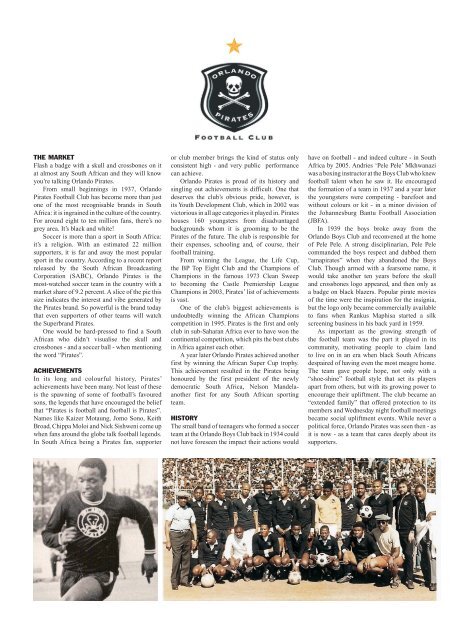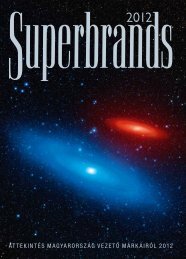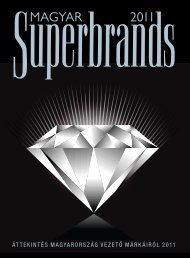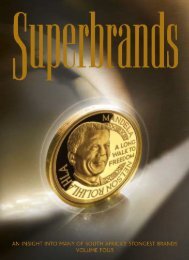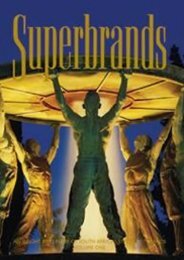South Africa Edition 2
You also want an ePaper? Increase the reach of your titles
YUMPU automatically turns print PDFs into web optimized ePapers that Google loves.
THE MARKET<br />
Flash a badge with a skull and crossbones on it<br />
at almost any <strong>South</strong> <strong>Africa</strong>n and they will know<br />
you’re talking Orlando Pirates.<br />
From small beginnings in 1937, Orlando<br />
Pirates Football Club has become more than just<br />
one of the most recognisable brands in <strong>South</strong><br />
<strong>Africa</strong>: it is ingrained in the culture of the country.<br />
For around eight to ten million fans, there’s no<br />
grey area. It’s black and white!<br />
Soccer is more than a sport in <strong>South</strong> <strong>Africa</strong>:<br />
it’s a religion. With an estimated 22 million<br />
supporters, it is far and away the most popular<br />
sport in the country. According to a recent report<br />
released by the <strong>South</strong> <strong>Africa</strong>n Broadcasting<br />
Corporation (SABC), Orlando Pirates is the<br />
most-watched soccer team in the country with a<br />
market share of 9.2 percent. A slice of the pie this<br />
size indicates the interest and vibe generated by<br />
the Pirates brand. So powerful is the brand today<br />
that even supporters of other teams will watch<br />
the Superbrand Pirates.<br />
One would be hard-pressed to find a <strong>South</strong><br />
<strong>Africa</strong>n who didn’t visualise the skull and<br />
crossbones - and a soccer ball - when mentioning<br />
the word “Pirates”.<br />
ACHIEVEMENTS<br />
In its long and colourful history, Pirates’<br />
achievements have been many. Not least of these<br />
is the spawning of some of football’s favoured<br />
sons, the legends that have encouraged the belief<br />
that “Pirates is football and football is Pirates”.<br />
Names like Kaizer Motaung, Jomo Sono, Keith<br />
Broad, Chippa Moloi and Nick Sishweni come up<br />
when fans around the globe talk football legends.<br />
In <strong>South</strong> <strong>Africa</strong> being a Pirates fan, supporter<br />
or club member brings the kind of status only<br />
consistent high - and very public performance<br />
can achieve.<br />
Orlando Pirates is proud of its history and<br />
singling out achievements is difficult. One that<br />
deserves the club’s obvious pride, however, is<br />
its Youth Development Club, which in 2002 was<br />
victorious in all age categories it played in. Pirates<br />
houses 160 youngsters from disadvantaged<br />
backgrounds whom it is grooming to be the<br />
Pirates of the future. The club is responsible for<br />
their expenses, schooling and, of course, their<br />
football training.<br />
From winning the League, the Life Cup,<br />
the BP Top Eight Club and the Champions of<br />
Champions in the famous 1973 Clean Sweep<br />
to becoming the Castle Premiership League<br />
Champions in 2003, Pirates’ list of achievements<br />
is vast.<br />
One of the club’s biggest achievements is<br />
undoubtedly winning the <strong>Africa</strong>n Champions<br />
competition in 1995. Pirates is the first and only<br />
club in sub-Saharan <strong>Africa</strong> ever to have won the<br />
continental competition, which pits the best clubs<br />
in <strong>Africa</strong> against each other.<br />
A year later Orlando Pirates achieved another<br />
first by winning the <strong>Africa</strong>n Super Cup trophy.<br />
This achievement resulted in the Pirates being<br />
honoured by the first president of the newly<br />
democratic <strong>South</strong> <strong>Africa</strong>, Nelson Mandelaanother<br />
first for any <strong>South</strong> <strong>Africa</strong>n sporting<br />
team.<br />
HISTORY<br />
The small band of teenagers who formed a soccer<br />
team at the Orlando Boys Club back in 1934 could<br />
not have foreseen the impact their actions would<br />
have on football - and indeed culture - in <strong>South</strong><br />
<strong>Africa</strong> by 2005. Andries ‘Pele Pele’ Mkhwanazi<br />
was a boxing instructor at the Boys Club who knew<br />
football talent when he saw it. He encouraged<br />
the formation of a team in 1937 and a year later<br />
the youngsters were competing - barefoot and<br />
without colours or kit - in a minor division of<br />
the Johannesburg Bantu Football Association<br />
(JBFA).<br />
In 1939 the boys broke away from the<br />
Orlando Boys Club and reconvened at the home<br />
of Pele Pele. A strong disciplinarian, Pele Pele<br />
commanded the boys respect and dubbed them<br />
“amapirates” when they abandoned the Boys<br />
Club. Though armed with a fearsome name, it<br />
would take another ten years before the skull<br />
and crossbones logo appeared, and then only as<br />
a badge on black blazers. Popular pirate movies<br />
of the time were the inspiration for the insignia,<br />
but the logo only became commercially available<br />
to fans when Rankus Maphisa started a silk<br />
screening business in his back yard in 1959.<br />
As important as the growing strength of<br />
the football team was the part it played in its<br />
community, motivating people to claim land<br />
to live on in an era when black <strong>South</strong> <strong>Africa</strong>ns<br />
despaired of having even the most meagre home.<br />
The team gave people hope, not only with a<br />
“shoe-shine” football style that set its players<br />
apart from others, but with its growing power to<br />
encourage their upliftment. The club became an<br />
“extended family” that offered protection to its<br />
members and Wednesday night football meetings<br />
became social upliftment events. While never a<br />
political force, Orlando Pirates was seen then - as<br />
it is now - as a team that cares deeply about its<br />
supporters.


